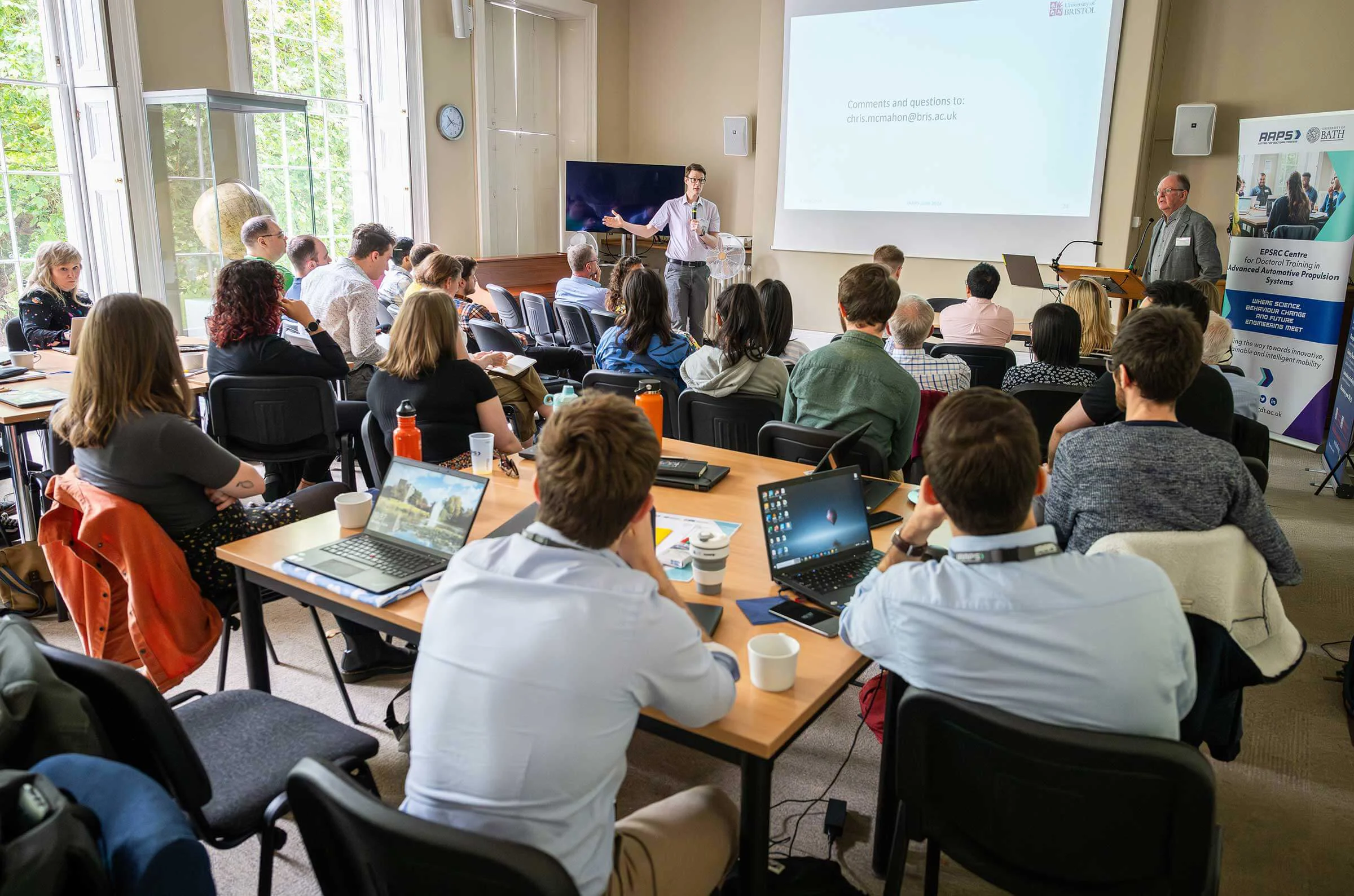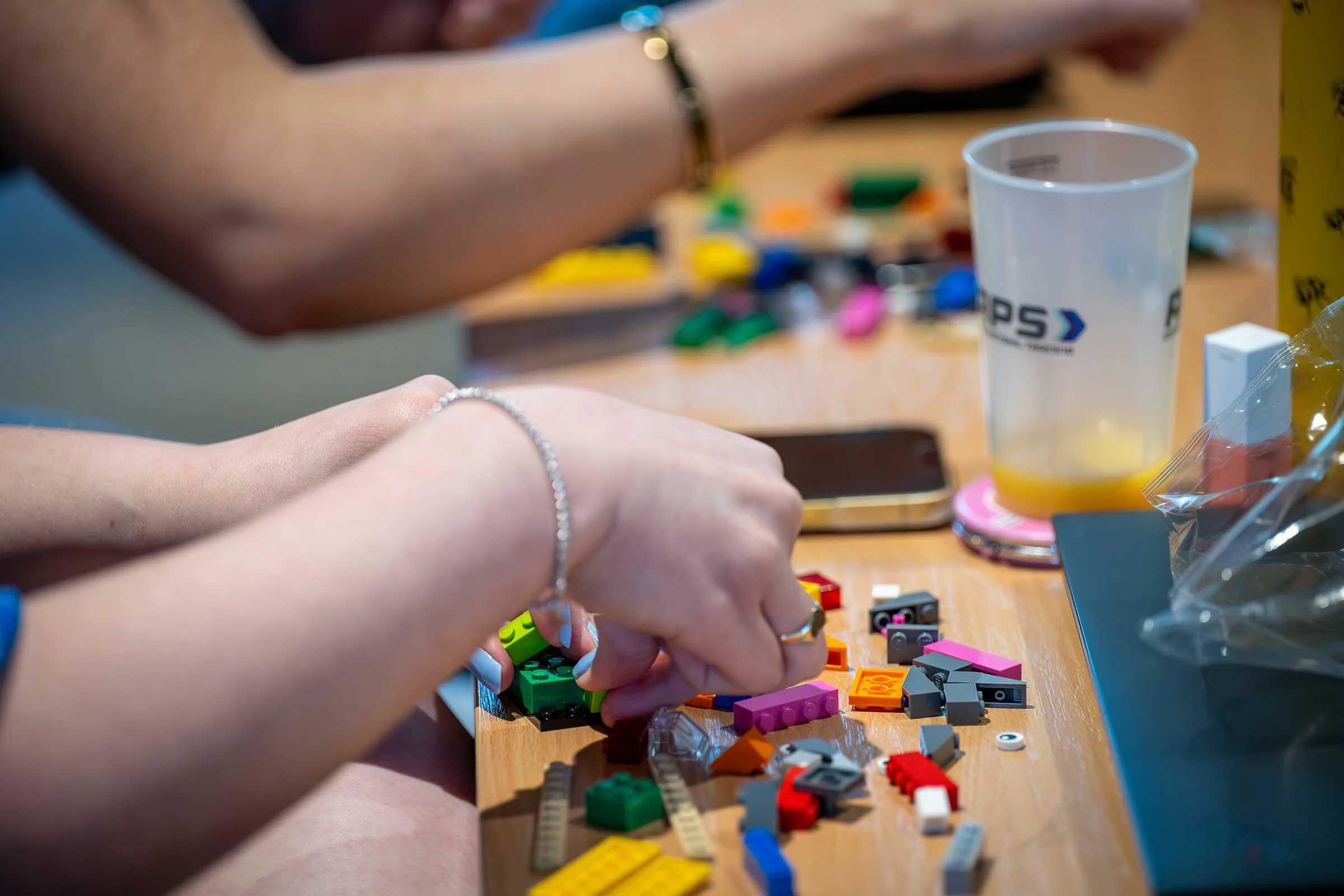June RI 2024: Digitalisation in Propulsion System Manufacturing
Posted by: Matt Hutchins
In June, Cohort 5 of the AAPS CDT held their second Research Incubator (RI) of 2024, on the topic of Digitalisation in Propulsion System Manufacturing. For those who don’t know, the RI is a week-long event that stimulates discussions and generates brand-new research surrounding the chosen topic.
To cohort 5, this was a conceptually new topic that challenged us outside of our comfort zone. Many of us are chemists, social scientists and engineers and we did not immediately see our expertise being useful to Digitalisation in Manufacturing (DM, for short). After an initial brainstorming session that led to more questions, we even considered changing the topic completely! But in the end, we were glad we didn’t: In a poll conducted by cohort 5, 3 in 5 cohort members found this RI to be more enjoyable than the 1st RI despite 100% of us being confused by Digitalisation Manufacturing initially. This goes to show that persevering against the unknown can sometimes lead to better destinations than sticking to our proverbial guns.
In the weeks leading up to the RI, Matthew Hutchins and Chloe Cannon were appointed as project managers. They were responsible for organising the team, setting expectations and boosting morale during tough times. They contacted the Centre for People-Led Digitalisation (the PLD), a research group at Bath focused on the human interactions in Digitalisation Manufacturing. The PLD were an essential asset during our preparation, guiding us with their vast expertise and putting us in contact with the right people at the right time. As a member of the PLD, our very own Edison Chamba (cohort 4) gave us an introduction to Digitalisation Manufacturing, introducing key concepts such as digital twins, Digitalisation Manufacturing barriers/enablers and cultures-attitudes analysis. The PLD would later be involved in reviewing our final sub-topics and starter presentations.
To start the week, we began to tell the story of Digitalisation Manufacturing. With the help of Professor Chris McMahon from the University of Bristol, we gave introductory presentations of the opportunities, technologies, interoperability, people and security of Digitalisation Manufacturing. Later down the line, these sub-topics would evolve into research proposals.
The outcome of novel research proposals at the RI is always exciting, but one begins to wonder, how do we accomplish all of this in under one week? Naturally, the answer is hard work and dedication, but there must be more to it than this. So how do we do it?
- Brainstorming & Clustering
After the introductory presentations, we split into new groups and discuss some of the thought-provoking aspects of Digitalisation Manufacturing. Our groups include both academics and industry, bringing a practical perspective to the topic. We use the Mural app to record everyone's thoughts and share to the RI attendees the insights we’ve discussed. The ideas here are taken further into one big, lovely, all-encompassing Mural. This is the product of a long overnight session where the CDT Management team include everyone’s ideas into clusters, or categories. These clusters become our final groups that we develop over the whole week.
- Team-building
After we form our final working group, we need to do some preparation to become a well-oiled machine. What do I mean by this? Put simply, if we don’t understand each other in the team, we will not deliver on the research proposals at the end of the RI week. On the second day after the clustering, Amin Neghavati came in to do some team exercises to help us get to know each other and to communicate. Amongst lessons of personal roles in a team, we learned how to “storm, form, norm and perform” according to Tuckman’s model of assembling a successful team. The best part is that we learned this through LEGO – who knew that colourful bricks could be such a useful aid in expressing these concepts?

- Interdisciplinarity
AAPS is our name and interdisciplinarity is our game. In our final groups, we bring together students, academics and industry experts from multiple fields to work on the assigned cluster. An example would probably be the best way to explain the importance of our interdisciplinarity. In my own team, we worked on the workforce cluster, meaning we focused on the current skills lacking from the propulsion sector when it comes to the digital transformation within the industry. We were able to navigate this cluster using political scientist Lucia Burtnik’s specialty in job databases; using economist Jac McCluskey’s appreciation of AI for predicting future skills; using the PLD’s Felicia Wang’s understanding of the automotive value chain; using assistant professor Stefania Esposito’s vision of incorporating universities as a key player in skills aquisition. It all comes together to form a multifaceted proposal to tackle the biggest social engineering challenges faced by DM in this decade.
- Healthy work balance
Attending an RI is not only problem-solving and tribulations. We also get to socialise and network with diverse groups of people. The brilliant CDT Management team puts together fully-catered and delicious lunches, a pit stop to recharge our batteries and to literally provide food for thought. On the penultimate day, we have pizza and late working (for those can’t get enough of pizza and late working) to fuel the final push before presentation day. However, one of the consistent highlights is the RI Dinner where we go to a restaurant on the second day of the event. Here, we get to bond with our newly-formed teams, setting the tone for the rest of the week.
So there you have it. The key ingredients for success during a demanding but rewarding RI. Post-RI, cohort 5 have written 15 proposals for new research to accelerate Digitalisation in Propulsion System Manufacturing. The knowledge unearthed throughout this week will remain with attendees as a new perspective to use in their professional work. The next RI will take on a new format, but it is sure to be boundary-pushing, horizon-broadening and knowledge-enriching. Make sure to look out for the next RI and to register for a unique collaborative experience for researchers and industry alike.
